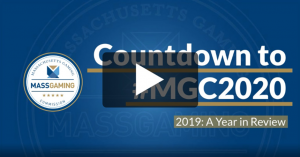
MASSACHUSETTS GAMING COMMISSION
A background of the Massachusetts Gaming Commission as the Commonwealth prepares to host 2020 IAGR conference in Boston
As the International Association of Gaming Regulators plans its 2020 Annual Conference and Members Business Meeting, the Massachusetts Gaming Commission would like to share its excitement in welcoming our colleagues to Boston in September.
Boston will serve as a special and most fitting venue for this year’s exciting conference agenda. Boasting an ever-expanding modern skyline that now extends deep into our seaport, Boston remains a city rich in history on full display from its North End to the Back Bay, energized by a population that is young, ethnically and racially diverse, and motivated to innovate and disrupt. Home to world-renowned educational and medical institutions, Boston and neighboring Cambridge cultivate and attract talent that supports the area’s leading reputation in technology, healthcare, finance, research and development, and manufacturing.
And, as of June of last year, just a short boat ride up the Mystic River from the Boston Harbor, after Wynn Resorts’ $70M investment to clean up a contaminated site that had left the waterfront inaccessible for nearly a century, the region is now the home of Encore Boston Harbor, Massachusetts’s second destination resort casino. It joins MGM Springfield (MGM Resorts) and the Commonwealth’s only slots facility, Plainridge Park Casino (Penn National).
The Expanded Gaming Act
In November 2011, Massachusetts legalized casino gaming, designed to create new jobs, generate new revenue for the Commonwealth, and contribute to the economic growth of the local economy. The Expanded Gaming Act allows for up to three destination resort casinos located in three geographically defined regions across Massachusetts, and a single slots-only facility competitively awarded for one location statewide.
The law also called for the creation of a five-member independent body, the Massachusetts Gaming Commission, to guide and oversee licensing and regulation for the state’s nascent gaming industry.
A New Chair
In February of 2019, Governor Charlie Baker appointed Cathy Judd-Stein as chair of the Commission. Cathy most recently served the Governor as his Deputy Chief Legal Counsel and ethics advisor, after serving the Commonwealth as part of five successive gubernatorial administrations.
“My responsibilities in the Baker Administration spanned state government, from complex human resource investigations and the standardization of critical workplace HR policies to facilitating enterprise-wide data sharing to strengthening access and opportunity for diverse communities and advising on education law and policy,” said Chair Judd-Stein.
Cathy is not, however, a newcomer to gaming issues. From 2011 -2013, the State Treasurer and Receiver appointed her Assistant Executive Director, Director of Policy and Special Counsel to the Massachusetts State Lottery Commission. In that capacity, she co-administered the Treasurer’s Online Products Task Force to explore the fiscal and social implications of online gaming in the Commonwealth. She collaborated with various state agencies and private entities on a number of additional statewide gaming issues and policies, including the impact of casino gaming on lottery play, tribal gaming, regulation of charitable gaming, and problem gaming. In 2013, she became the State Treasurer’s General Counsel.
“I accepted my appointment as Chair of the Gaming Commission knowing that my fellow Commissioners prioritize the agency’s mission to implement the gaming law in a manner that is fair, transparent and participatory. The Legislature certainly intended to maximize the casino industry’s economic benefits, but thoughtfully directed the Commission to mitigate unintended impacts. It is gratifying to work with such an experienced team at the intersection of complex, important public and private sector issues, particularly at a time when the gaming industry is evolving so rapidly given significant technological advancements.”
Casino Industry Impacts and Mitigations
To date, gaming tax revenue to the Commonwealth has exceeded $500 million, and the industry has created more than 12,000 construction jobs and 7,000 operational jobs. Notably, more tradeswomen worked on-site at Encore Boston Harbor than on any other construction site in our nation’s history.
In fact, data presented by the Commission’s Office of Workforce, Supplier and Diversity Development shows that both the operations and construction phases of the state’s three casinos contributed significantly to the workforce and economic development opportunities for diverse residents and business owners across the Commonwealth.
Establishing a diverse workforce and ensuring opportunities for minority, women and veteran-owned businesses is a priority for the Commission. In October 2019, the Commission proudly released a report entitled “Build to Last: Best Practices for Diversity in the Construction Industry,” summarizing the strategies and lessons learned during casino development to achieve workforce and contractor diversity.
The licensees are important community partners. In its first year of operation, MGM Springfield secured LEED Platinum certification: a first for the casino industry. Just recently, the resort unveiled its extensive solar canopy dedicated to generating nearly 10% of the property’s power needs. Plainridge Park Casino, prior to its opening four years ago, entered into a host community agreement, which allowed the town of Plainville to use casino revenue streams to finance the construction of a state of the art public safety facility.
The multi-faceted Expanded Gaming Act also establishes a first-of-its-kind research plan to comprehensively assess the social and economic impacts of casino gambling in Massachusetts. The robust research agenda required a comprehensive baseline study followed by a repeated, in-depth longitudinal analysis. A data-driven understanding of casino impacts provides the Commission with the ability to design evidence-based programming, particularly in the area of problem gaming.
This is especially important because Massachusetts is the only gaming jurisdiction in the country to require responsible gaming services (GameSense Info Centers and GameSense Advisors) on-site at the casinos. Accordingly, in 2015, the Commission launched GameSense, an innovative, player-focused responsible gaming program, encouraging players to adopt behaviors and attitudes that reduce the risk of gambling-related harm.
Early evaluation of the program offers an encouraging outlook on its impact and effectiveness. 54% of surveyed patrons had a high degree of program awareness, 98% were satisfied with the information provided by GameSense advisors, and 44% report the program changed the way they think about their gambling behavior.
Reflecting on 2019 and Looking Ahead to 2020
As 2019 came to a close, the Commission reflected on what had been a dynamic and productive year for the Commonwealth’s emerging gaming industry:

Now, the Commission anticipates many significant milestones, including welcoming IAGR with open arms in 2020, showcasing to our fellow gaming regulators from around the world what Boston and Massachusetts have to offer. See you in September!





